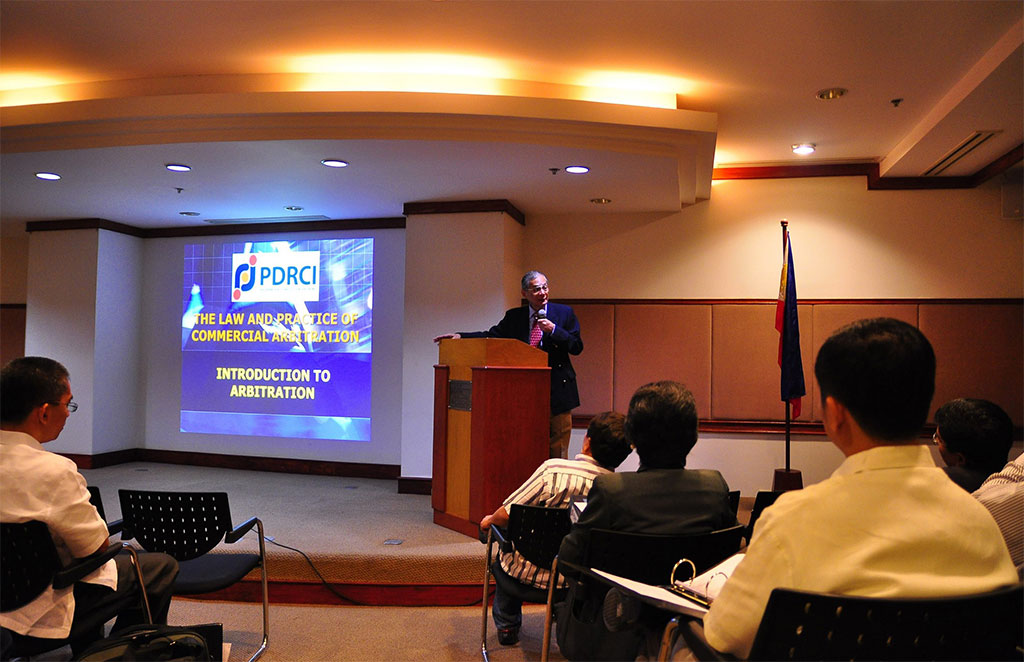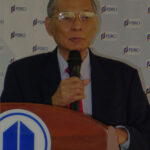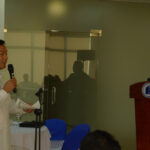
PDRCI holds 6 arbitration training seminar th By Arveen N. Agunday DRCI recently held conducted its 6 arbitration training seminar on July 3 to 5, 2013 at the auditorium of Sycip Salazar Hernandez th and Gatmaitan law office in Makati City. More than 30 professionals, mostly lawyers from major Philippine law firms, participated.
The seminar on “The Law and Practice of Commercial Arbitration” introduced participants to commercial arbitration and trained prospective arbitrators in conducting a commercial arbitration. Six renowned arbitrators served as lecturers. Attys. Arthur P. Autea and Salvador S. Panga, Jr. discussed Introduction to Arbitration and PreArbitration Issues, respectively, on the first day. They were followed by Atty. Eduardo R. Ceniza, former PDTCI President, and Atty. Roberto N. Dio, who lectured on the second day on Commencing the Arbitration and Pre-Hearing Considerations, respectively.
On the last day of training, PDRCI President Atty. Victor P. Lazatin and Dean Custodio O. Parlade talked, on the conduct of arbitration hearings and the recognition, challenge, enforcement and vacation of arbitral awards.
At the close of the lectures each day, the participants were assigned homeworks that required them to draft various documents and submissions. The participants’ completion of the three-day seminar and their submission of the required documents would entitle them to accreditation as arbitrators by the Philippine Office for Alternative Dispute Resolution (OADR).
After the training, some participants opted to take the written examination on July 6, 2013 at PDRCI’s office. Those who pass the examination will be included in the roster of PDRCI-trained arbitrators and be eligible to be appointed as arbitrator (but not as sole arbitrator or Chairman of an arbitral tribunal) in any arbitration administered by the PDRCI.
An afternoon with the Hong Kong International Arbitration Centre
 On May 23, 2013, PDRCI hosted Chiann Bao, Secretary General of the Hong Kong International Arbitration Centre (HKIAC), who talked on the recent revisions to the HKIAC Administered Arbitration Rules before a group of Filipino arbitrators and counsel. Ms. Bao was assisted by Johanna Aleria Lorenzo, who recently interned at the HKIAC.
On May 23, 2013, PDRCI hosted Chiann Bao, Secretary General of the Hong Kong International Arbitration Centre (HKIAC), who talked on the recent revisions to the HKIAC Administered Arbitration Rules before a group of Filipino arbitrators and counsel. Ms. Bao was assisted by Johanna Aleria Lorenzo, who recently interned at the HKIAC.
After PDRCI President Victor P. Lazatin welcomed the participants, PDRCI member Patricia Ann T. Prodigalidad introduced Ms. Bao who first gave an overview of Hong Kong arbitration law and of the HKIAC. Ms. Lorenzo then gave a sneak preview of the 2013 HKIAC Administered Arbitration Rules which will become effective on November 1, 2013. According to Ms. Bao:
- • Hong Kong has a transparent and independent legal system, with user-friendly arbitration legislation. Hong Kong has in place a pro-enforcement framework, which gave rise to an arbitration culture.
- • Hong Kong’s present arbitration law is the Hong Kong Ordinance Cap. 609, which became effective on June 1, 2011. This new Arbitration Ordinance unified the international arbitration regime and the domestic arbitration regime, by effectively extending the application of the UNCITRAL Model Law to all arbitrations in Hong Kong.
- • To complement the user-friendly legislative and administrative initiatives, Hong Kong case law supports party autonomy and maintains a pro-enforcement stance.
- • The HKIAC was established in 1985 as an independent non-profit organization. It has 20 fulltime staff, with an international and multilingual Secretariat representing both common law and civil law traditions. At present, it has more than 300 arbitrators and more than 500 mediators.
- • Among others, the HKIAC acts as: (a) administrator of arbitrations, mediations and domain name disputes; (b) appointing authority under the Hong Kong Arbitration Ordinance; (c) hearing center for arbitrations and mediations; (d) fund holder for arbitrations; and (e) administration center for arbitration institutes such as the Chartered Institute of Arbitrators (East Asia Branch), the Hong Kong Institute of Arbitrators, and the Society of Construction Law.
- • In 2012, the HKIAC handled 456 dispute matters, 293 of which were arbitrations. Of these 293 arbitrations, 68% were international arbitrations, while 32% were domestic arbitrations. Sixty-eight arbitrations, with a total amount in dispute of US$1.8 billion, were fully administered by the HKIAC in accordance with its Rules.
Ms. Lorenzo reported that:
- • While the HKIAC Administered Rules were introduced on September 1, 2008, the New Rules will take effect on November 1, 2013. The Rules apply to both domestic and international arbitrations and is patterned after the Swiss Arbitration Rules.
- • The revisions seek to support party autonomy with an efficient administrative framework, keep HKIAC in line with other leading arbitration rules and best practices, improve the parties’ ability to control costs, and make the rules clearer to users.
- • The key revisions include provisions on complex arbitrations (such as provisions on joinder, consolidation, and single arbitration involving multiple contracts), streamlined arbitrator’s fees and expenses, emergency arbitrators, expedited procedure, and HKIAC’s prima facie power to proceed.
- • Regarding joinder, Article 27 grants the Tribunal, and the HKIAC if the request is made before the Tribunal is constituted, prima facie power to order the joinder of a third party, if the latter is bound by a valid arbitration agreement. The joinder can be requested by either the existing party or by an additional party.
- •
 Regarding consolidation, Article 28 grants the HKIAC the power to consolidate at the request of a party where the parties agree, or all claims are under the same arbitration agreement, or claims are under more than one “compatible” arbitration agreement but relate to common questions of law or fact and the rights arise out of the same transaction or series of transactions.
Regarding consolidation, Article 28 grants the HKIAC the power to consolidate at the request of a party where the parties agree, or all claims are under the same arbitration agreement, or claims are under more than one “compatible” arbitration agreement but relate to common questions of law or fact and the rights arise out of the same transaction or series of transactions. - • Regarding single arbitration involving multiple contracts, Article 29 allow for claims under more than one contract to be made in a single arbitration if all parties are bound by each arbitration agreement, and a common question of law or fact arises out of the same transaction or series of transactions, and the arbitration agreements are compatible.
- • Regarding arbitrator’s fees and expenses, Article 9 and 10, and Schedules 2 and 3, provide that parties may choose to apply hourly rate (which is the default) or the schedule based on sum in dispute. The hourly rate is capped at HK$6,500 (about PhP35,230), unless all parties agree or the HKIAC so determines, and the schedule based on sum in dispute shall be simplified. HKIAC also provides for standard terms of appointment and practice notes to give further guidance.
- • Regarding emergency arbitrators (EA), Article 23.1 and Schedule 4 allows a party to apply for emergency relief concurrent with or after the filing of the Notice of Arbitration. The EA is to be appointed within two days from HKIAC accepting the application, and is to decide within 15 days of receiving the file. The EA’s decision binds the parties but the decision can be modified, suspended or terminated by the EA or by the Tribunal. The EA’s power ceases once the Tribunal is constituted, and the EA cannot act as arbitrator without the parties’ agreement.
 • Regarding expedited procedure, Article 41 allows a party to apply to the HKIAC for an expedited procedure when the amount in dispute is less than HK$25 million (about PhP135.5 million),
• Regarding expedited procedure, Article 41 allows a party to apply to the HKIAC for an expedited procedure when the amount in dispute is less than HK$25 million (about PhP135.5 million),- • or the parties agree, or in cases of exceptional urgency. The expedited proceedings shall be heard by a sole arbitrator (unless the agreement provides otherwise and the parties to do not agree to alter), with shortened procedural time limits, shall be determined based on documents only, and shall have the award in summary form rendered within six months.
- • Regarding the HKIAC’s prima facie power to proceed, Article 19 provides that the Tribunal has the power to rule on its own jurisdiction but, where there is an objection to jurisdiction before the Tribunal is constituted, the HKIAC can proceed if prima facie satisfied that an arbitration under the HKIAC Administered Arbitration Rules may exist. The Tribunal ultimately decides any objection to jurisdiction. The talk was followed by an open forum, after which PDRCI President Emeritus, Dean Custodio O. Parlade, gave the closing remarks to end the formal program.
